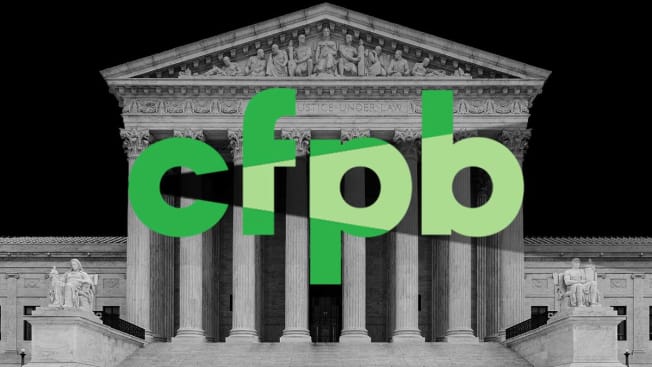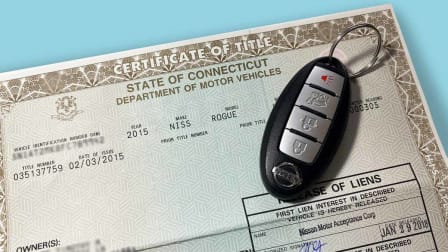Here’s What Could Happen If the Supreme Court Declares the CFPB Unconstitutional
Protections that Americans have come to count on could fall away

Update: The U.S. Supreme Court ruled on May 16, 2024, that the funding mechanism authorized by Congress for the Consumer Financial Protection Bureau through the Federal Reserve Board is constitutional. The decision "is a major victory for consumers that will enable the CFPB to continue working to foster a fair, competitive, and transparent financial marketplace,” says Delicia Hand, senior director of digital marketplace for Consumer Reports.
The U.S. Supreme Court will hear arguments this week in a case that could undermine much of what the Consumer Financial Protection Bureau has done to protect consumers since its launch more than 12 years ago, in the wake of the 2008 financial crisis.
If the justices don’t reverse a lower court’s 2022 decision, experts say, CFPB rules that protect consumers from junk fees, risky mortgages, discriminatory practices, predatory lenders, abusive debt collectors, and more could all be called into question and possibly nullified. And the agency’s ability to enforce consumer protection laws—even those predating its existence—could evaporate.
Perhaps most concerning, the system that enables Americans to obtain mortgages—and thus buy and sell homes—could, in the words of the industry’s own lawyers, “grind to a halt,” delivering a gut blow to the broader economy.
“With consumer prices on the rise and financial companies introducing powerful and sometimes risky technologies into everyday consumer transactions, a ruling against the CFPB would cripple this vital watchdog at the worst possible moment,” says Delicia Hand, director of financial fairness advocacy at Consumer Reports.
The case began as a 2018 lawsuit by the Community Financial Services Association of America, which lobbies on behalf of short-term, ultra-high-interest “payday” lenders. That suit challenged the Payday Lending Rule, which prevents lenders from repeatedly trying to pull money from borrowers’ empty accounts, sometimes triggering hundreds of dollars in overdraft fees.
CFPB Rules Could Go Poof
So what happens if all the agency’s rules are suddenly open to legal challenge?
“We’re already in a kind of regulatory purgatory in the Fifth Circuit, where some companies are saying the rules mean nothing,” says Elyse Hicks, consumer policy counsel at the nonprofit Americans for Financial Reform. “We could have a broader version of that if the Supreme Court decides the Fifth Circuit is right.”
On a practical level, that could mean a resurgence of the unfair, deceptive, and abusive practices those rules targeted is likely.
Junk fees are one example. The CFPB is engaged in a multiyear campaign against unfair and excessive fees charged by banks, credit card companies and others, but it has already notched some wins. Last year, for example, it told banks to stop charging “surprise” overdraft fees—like when customers check to make sure they have enough funds before making a debit card purchase, but then get hit with a fee because of some confusing back-office accounting maneuvers.
Dangerous mortgages could also make a comeback. In the run-up to the financial crisis, many lenders were saddling consumers with highly risky mortgages they couldn’t afford, including “interest only” and “negative amortization” loans (where the principal doesn’t go down even after years of payments). The CFPB largely put a stop to all that in 2013, requiring lenders to be reasonably sure borrowers can repay their mortgages, and clamping down on the kinds of loans most likely to get borrowers in trouble. If those rules go, we could very well see another race to the bottom (as well as broader industry chaos; more on that below).
We might also see a new chapter in the long history of shady debt collection practices, which in recent years included the use of fake identities and relentless robocalling to coerce consumers to pay debts they didn’t even owe. In 2021, the CFPB made it illegal to harass or threaten consumers when trying to collect on a debt, and required collectors to prove the debts they’re collecting are real, that they’re legally authorized to collect them, and that the amount they’re seeking is accurate.
The CFPB has issued more than 100 such rules since its inception.
Ongoing Proposals Could Die on the Vine
The nonprofit, nonpartisan Center for American Progress says a Supreme Court decision upholding the Fifth Circuit “would effectively defund the CFPB, resulting in the cessation of day-to-day administrative activities necessary to fulfill its statutory mission and could result in hundreds of layoffs of federal employees.”
Amid such institutional uncertainty and budgetary constraints, it’s unlikely the CFPB could push even high-priority measures through the regulatory process. Examples of proposals that could wither this way include the CFPB’s February 2023 proposal aimed at excessive credit-card late fees, which would close a loophole in a 2009 law that’s costing Americans some $12 billion a year.
Victims of Unfair Financial Practices Might Not Get Their Money Back
Another of the CFPB’s core duties is the enforcement of bedrock statutes that govern the consumer finance industry, many of which pre-date the CFPB by decades. At its founding, the CFPB was made responsible for enforcing the Equal Credit Opportunity Act, the Fair Credit Reporting Act, the Fair Debt Collection Practices Act, the Military Lending Act, and the Truth in Lending Act, and more than a dozen others.
Since 2012, the agency’s enforcement of these and other rules and regulations have returned $17.5 billion to some 200 million consumers in the form of direct compensation, principal reductions, canceled debts, and other relief, and the CFPB has placed an additional $4 billion in penalties into a victims’ relief fund.
The agency’s ability to go after wrongdoers has already been severely blunted by last year’s Fifth Circuit decision, with more than a dozen consumer finance companies using the ruling to seek dismissals or delays of CFPB enforcement suits. At least six federal and state courts have agreed to put CFPB cases on hold while the Supreme Court decision is pending.
Among them is MoneyGram, one of the largest “remittance” companies specializing in helping people, including immigrants, transfer money to and from other countries. MoneyGram is accused of needlessly delaying the delivery of funds. Lawyers for the company argued last year that the CFPB’s 2013 Remittance Rule, which it allegedly violated, is “void and unenforceable” because of the Fifth Circuit’s conclusion.
Another example: Credit reporting agency TransUnion tried to use the Fifth Circuit ruling to dismiss CFPB allegations that it used deceptive marketing, including manipulative online “deceptive designs,” to lure consumers into purchases. (In that case, a Chicago federal judge let the CFPB’s enforcement move forward.)
The Housing Market Could Seize Up, Weakening the Economy
The CFPB was created in the aftermath of the 2008 financial crisis, which had been triggered by the collapse of the U.S. mortgage market. So one of its first priorities was to create new rules governing everything from the kind of underwriting lenders must do to be reasonably sure borrowers can pay back their loans, to disclosure documentation, to loan servicing and foreclosure processes. Many such rules were created in direct response to flawed or abusive industry practices that contributed to the financial crisis.
In addition to protecting consumers, those rules have become an essential component of the U.S. housing industry. They’re “baked into the daily functioning of the mortgage industry,” says an amicus brief filed in the Supreme Court by the Mortgage Bankers Association, the National Association of Home Builders of the United States, and the National Association of Realtors.
Their brief notes says such rules were developed with input from the industries themselves, which have invested billions in building operational infrastructure around them. “Virtually all financial transactions for residential real estate in the United States depend upon compliance with the CFPB’s rules, and consumers rely on the rights and protections provided by those rules,” they say.
So what happens if those rules are suddenly called into question? “Potentially catastrophic consequences,” the industry’s own lawyers warn.
What Could Be Next?
If the Supreme Court does back the Fifth Circuit, says Hicks from Americans for Financial Reform, Congress will need to step in and clean up the fallout—by funding the CFPB in a way that passes constitutional muster, codifying CFPB rules itself, or both.
CR’s Hand agrees. “Congress needs to be prepared to stave off further economic stress and chaos by protecting the Bureau’s independence and funding,” she says. “CR will continue to work with our allies to ensure that the CFPB is empowered to defend the interests of consumers and rein in predatory financial industry practices.”




